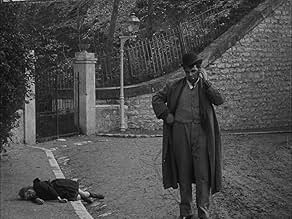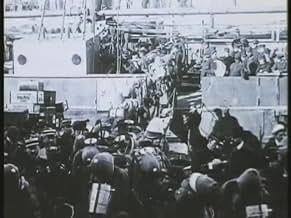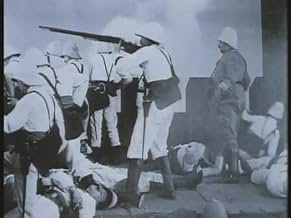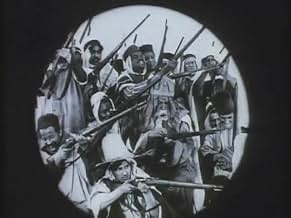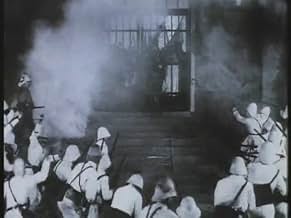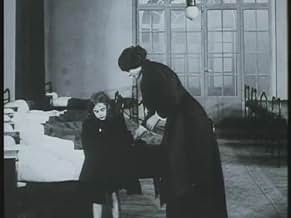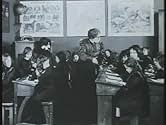Aggiungi una trama nella tua linguaThe young daughter of an army captain missing in action runs away from school and is kidnapped by Parisian lowlifes. When the kidnapper flees to Nice with the child, the kind-hearted employe... Leggi tuttoThe young daughter of an army captain missing in action runs away from school and is kidnapped by Parisian lowlifes. When the kidnapper flees to Nice with the child, the kind-hearted employee of one of his accomplices sets off in pursuit.The young daughter of an army captain missing in action runs away from school and is kidnapped by Parisian lowlifes. When the kidnapper flees to Nice with the child, the kind-hearted employee of one of his accomplices sets off in pursuit.
- Regia
- Sceneggiatura
- Star
Henri Duval
- Jacques de Valen
- (as Henry Duval)
Recensioni in evidenza
I first heard of this film in an interview thirty years ago with Edward Gory (imdb is trying to correct my spelling, that should be g-o-r-e-y), and it's hard to imagine a more perfect audience for this movie, with its tale of an innocent little girl who loses her parents (one in war, the other to the usual collapse Victorian wives succumb to) and winds up in the hands of scoundrels, only to acquire a purehearted protector in their ranks. (He is, in a nod to Hugo, a slight hunchback.)
The unspooling of this melodrama is hypnotic, in Perret's clear-eyed and skillful telling; even so well-crafted an American film as Traffic in Souls from the same year seems remote and unsteady compared to the clean, perfectly efficient visuals and editing here. That said, it is a modest disappointment that the little girl-- a charmingly capable miniature Bernhardt, able to pull off every Victorian stage gesture never seen in real children-- becomes little more than a prop over time; her plight is never milked for the emotional effect it could have. If there's an apparent flaw in Perret's work-- comparing it not to other 1913 films but to the later teens films it seems the peer of-- it's that he doesn't seem as interested in his actors as you'd like him to be. They're all obviously skilled, and play their types perfectly to type, and he shoots them in medium shot so we can actually see their faces; but there's no reason for a movie called The Child of Paris to be decorous in its playing-- it ought to pull out all the stops and jerk tears like Griffith a few years later. What starts as a serial seems to end as a neatly solved puzzle.
Still, Kino's release of this film in its Gaumont set is an enormously important release that does some serious rewriting of the standard film history.
The unspooling of this melodrama is hypnotic, in Perret's clear-eyed and skillful telling; even so well-crafted an American film as Traffic in Souls from the same year seems remote and unsteady compared to the clean, perfectly efficient visuals and editing here. That said, it is a modest disappointment that the little girl-- a charmingly capable miniature Bernhardt, able to pull off every Victorian stage gesture never seen in real children-- becomes little more than a prop over time; her plight is never milked for the emotional effect it could have. If there's an apparent flaw in Perret's work-- comparing it not to other 1913 films but to the later teens films it seems the peer of-- it's that he doesn't seem as interested in his actors as you'd like him to be. They're all obviously skilled, and play their types perfectly to type, and he shoots them in medium shot so we can actually see their faces; but there's no reason for a movie called The Child of Paris to be decorous in its playing-- it ought to pull out all the stops and jerk tears like Griffith a few years later. What starts as a serial seems to end as a neatly solved puzzle.
Still, Kino's release of this film in its Gaumont set is an enormously important release that does some serious rewriting of the standard film history.
The Child of Paris is the one feature included on Kino's early film collection Gaumont Treasures. This Dickensian story follows a young girl from a privileged background who becomes separated from her family. First, she is placed in a boarding school and then later falls into the hands of a drunk cobbler and the leader of a band of thieves. Our heroine has one friend, Bosco the cobbler's assistant. The film is not as melodramatic as it could have been. For instance, no one at the boarding school is physically abusive to the young girl. It is probably even a good school, just not for a depressed child who thinks she has lost everything.
The Child of Paris was made two years before Birth of a Nation. My knowledge of features from that era is limited, making a fair assessment of The Child of Paris difficult. I have watched Cabiria (made a year later) and remember it fondly. I have also watched The Last Days of Pompeii (also made in 1913) and found that film a struggle to finish. Otherwise, my frame of reference for pre-Birth films is limited to shorts. All that aside, I would still wager that this film was ahead of its time. There are a handful of wonderful moments (the escape from the boarding school; the returning hero saluting the crowd as his heart is breaking; and Bosco on a hilltop framed against a glittering sea in Nice). All of these make this film memorable.
On a personal note, I found the film somewhat prolonged at 124 minutes. The story appears to end at about the halfway point but then the villain gets away with the girl at the last moment. The second half focuses on Bosco, the little heroine's one friend, trying to save her. The film gets a little bogged down in scenes of Bosco in Nice (despite some wonderful scenery).
The Child of Paris is a good film and of historical importance. Kino deserves much thanks for rescuing this title. However, although I liked the film, my enthusiasm is not as strong as the other reviewers.
The Child of Paris was made two years before Birth of a Nation. My knowledge of features from that era is limited, making a fair assessment of The Child of Paris difficult. I have watched Cabiria (made a year later) and remember it fondly. I have also watched The Last Days of Pompeii (also made in 1913) and found that film a struggle to finish. Otherwise, my frame of reference for pre-Birth films is limited to shorts. All that aside, I would still wager that this film was ahead of its time. There are a handful of wonderful moments (the escape from the boarding school; the returning hero saluting the crowd as his heart is breaking; and Bosco on a hilltop framed against a glittering sea in Nice). All of these make this film memorable.
On a personal note, I found the film somewhat prolonged at 124 minutes. The story appears to end at about the halfway point but then the villain gets away with the girl at the last moment. The second half focuses on Bosco, the little heroine's one friend, trying to save her. The film gets a little bogged down in scenes of Bosco in Nice (despite some wonderful scenery).
The Child of Paris is a good film and of historical importance. Kino deserves much thanks for rescuing this title. However, although I liked the film, my enthusiasm is not as strong as the other reviewers.
Leonce Perret is virtually forgotten in France where Feuillade's "Vampires" and "Fantômas " have been recently released on DVD in deluxe box sets;and however I do think that his "Mystères Des Roches De Kador " displayed more originality,more ambition and more modernity than the whole far-fetched Irma Vep and co's interminable story : psychonanalysis and a deja vu experience were not that much common in 1912 French cinema.
"L'Enfant De Paris" is pure melodrama ;its screenplay was influenced by the classics of French melodramatic literature from the nineteenth century : "Les Mystères De Paris " ," La Porteuse De Pain" or "Les Deux Orphelines " which DW Griffith transferred to the screen as "orphans of the storm" ;the latter (the novel) did inspire Perret's screenplay too : the drunk brute is an equivalent of La Frochard and Bosco plays more or less the role of her good son.
That said ,and mainly in its first part ,"L 'Enfant De Paris"has stood the test of time triumphantly :the first part is dense ,eventful and features lots of great scenes ,still impressive today:
-Happiness time, the ending of which is masterfully conducted ,when the score segued from the old French folk song " Sous Le Pont D'Avignon" into a military dirge .
-the depiction of the boarding-school , the lugubrious dormitory , the girl deprived of her only friend, her doll, her mates making her their punching bag (the scene of their faces in the classroom is extraordinary)
-the drunkard ,some kind of Hugo's Thénardier who treats the little girl like a slut ,a Cosette who's refused a piece of bread.
-the relationship with hunchback Bosco ,himself in search of love,tenderness and affection.
Things deteriorate a little in the second part during Bosco's investigation:as a critic noticed , Perret has not got a sense of the "meanwhile" ,and the desperate daddy and good housekeeper Marion completely disappear from the screen ;Bosco 's visit of the Carmen villa drags on whereas there was never a dull moment in the first half .One should notice,however, that Perret was one of the first artists to take the cinema out of the studios ,and some scenes were filmed on location in Nice (and even on the Champ De Mars at the beginning) ;and there are great moments such as that of the ladies in their barouche ("I'm no beggar!)or that of the restaurateur who drives the hunchback out of his place .
That this movie should be ignored in its native France is really disgraceful.
"L'Enfant De Paris" is pure melodrama ;its screenplay was influenced by the classics of French melodramatic literature from the nineteenth century : "Les Mystères De Paris " ," La Porteuse De Pain" or "Les Deux Orphelines " which DW Griffith transferred to the screen as "orphans of the storm" ;the latter (the novel) did inspire Perret's screenplay too : the drunk brute is an equivalent of La Frochard and Bosco plays more or less the role of her good son.
That said ,and mainly in its first part ,"L 'Enfant De Paris"has stood the test of time triumphantly :the first part is dense ,eventful and features lots of great scenes ,still impressive today:
-Happiness time, the ending of which is masterfully conducted ,when the score segued from the old French folk song " Sous Le Pont D'Avignon" into a military dirge .
-the depiction of the boarding-school , the lugubrious dormitory , the girl deprived of her only friend, her doll, her mates making her their punching bag (the scene of their faces in the classroom is extraordinary)
-the drunkard ,some kind of Hugo's Thénardier who treats the little girl like a slut ,a Cosette who's refused a piece of bread.
-the relationship with hunchback Bosco ,himself in search of love,tenderness and affection.
Things deteriorate a little in the second part during Bosco's investigation:as a critic noticed , Perret has not got a sense of the "meanwhile" ,and the desperate daddy and good housekeeper Marion completely disappear from the screen ;Bosco 's visit of the Carmen villa drags on whereas there was never a dull moment in the first half .One should notice,however, that Perret was one of the first artists to take the cinema out of the studios ,and some scenes were filmed on location in Nice (and even on the Champ De Mars at the beginning) ;and there are great moments such as that of the ladies in their barouche ("I'm no beggar!)or that of the restaurateur who drives the hunchback out of his place .
That this movie should be ignored in its native France is really disgraceful.
What a shame that the films of Leonce Perret are so little known in the United States! Having just seen a crisply restored version of "L'enfant de Paris" (The Child of Paris), I am now eager to see more Perret films. The Kino version of "L'enfant de Paris", at 16 frames per second, runs just over two hours long, and is captivating from beginning to end.
The story centers around a young girl who suffers the loss of both parents. Coming from a family of means, the little girl is sent to an exclusive, but strict, boarding school. After a few unhappy experiences at the school, the girl escapes, only to land in the care of a dangerous thief and a drunken cobbler. A young hunchback who works for the cobbler (young Bosco) befriends the little girl and shows her some much-needed compassion. With amazing delicacy, the story begins to focus as much on Bosco as the little girl - two children of Paris, two outcasts.
The film is epic. Many scenes were shot on location in Paris and Nice. These cities, from a century ago, are fascinating enough, but the direction by Perret is outstanding. He employs low angle and high angle shots, tracking shots and moody back lighting. Some scenes are surprisingly tense; others are wonderfully tender. The story is constructed with sophistication. The acting is generally quite subdued and realistic - very palatable for our modern tastes.
You may think that a pre-WWI film with somewhat Dickensian characters and child protagonist would be too melodramatic to be enjoyable. I found the opposite to be true; I loved this exciting early-twentieth-century slice of life. Even though this is a very old movie, I enjoyed this as much as any contemporary feature length film. If you've sampled some silent cinema and are interested in seeing another high-quality example, check out "L'enfant de Paris" on the Gaumont Treasures DVD from Kino.
The story centers around a young girl who suffers the loss of both parents. Coming from a family of means, the little girl is sent to an exclusive, but strict, boarding school. After a few unhappy experiences at the school, the girl escapes, only to land in the care of a dangerous thief and a drunken cobbler. A young hunchback who works for the cobbler (young Bosco) befriends the little girl and shows her some much-needed compassion. With amazing delicacy, the story begins to focus as much on Bosco as the little girl - two children of Paris, two outcasts.
The film is epic. Many scenes were shot on location in Paris and Nice. These cities, from a century ago, are fascinating enough, but the direction by Perret is outstanding. He employs low angle and high angle shots, tracking shots and moody back lighting. Some scenes are surprisingly tense; others are wonderfully tender. The story is constructed with sophistication. The acting is generally quite subdued and realistic - very palatable for our modern tastes.
You may think that a pre-WWI film with somewhat Dickensian characters and child protagonist would be too melodramatic to be enjoyable. I found the opposite to be true; I loved this exciting early-twentieth-century slice of life. Even though this is a very old movie, I enjoyed this as much as any contemporary feature length film. If you've sampled some silent cinema and are interested in seeing another high-quality example, check out "L'enfant de Paris" on the Gaumont Treasures DVD from Kino.
Let us first establish the situation that existed in 1913. Leaving aside a few curiosities from earlier years (the 1906 Story of the Kelly Gang is not the only one), films of about 50 minutes long only really began to appear in 199 and the only a handful of which the Italian L' Inferno and the Danish Den sorte Dreøm are probably the best. By 1913 such feature-length films had been made almost everywhere in the world although not all survive. In 1912 they included at least one film that was apparently originally two hours long (Romanian as it happens) but it was only in 1913 that the first really significant features began to appear - Atlantis (Denmark), Germinal and L'Enfant de Paris (both France), all three of which are about two hours long, three Italian epics (In hoc signo vinces (In questo segno vincerai), Quo Vadis and Jone ovvero gli ultimi giorni di Pompei, one of two versions in the year, both of which survive, at least six US film, Ince's The Battle of Gettysburg, sadly lost but almost certainly anticipating many of the things that would later be used by Grfifith in A Birth of a Nation, Lime Kiln Field Day, most remarkably of all starring black comedian Bert Williams, sadly never finished, Traffic in Souls, a reworking of earlier Danish films, which survives in a truncated version and The Trap starring Lon Chaney and rather feeble versions of Ivanhoe and The Deerslayer. Other films of over an hour include the excellent Ingeborg Holm (Sweish),, several Austrian and German films including the first version of Der Student von Prag, a rather poor British version of Hamlet, a splendid Italian absurdist comedy, Le avventure straordinarissime di Saturnino Farandola and at least two Russian films, the excellent Sumerki zhenskoi dushi (just under 50 minutes) and rather surprisingly a full-length documentary about the life of the Jews in Palestine.
So 1913 was not just any year (and there is certainly no excuse for the usual bleat of "good for 1913"); it was the first really important year for full-length feature films and all round the world - (Dhundiraj Govind Phalke's Raja Harischindra appeared the same year in India although not much survives its original length is a little uncertain - film-makers puleld out the stops to celebrate the fact.
1914 (the year of the wonderful Cabiria and of the classic Feuillade serial Fantômas) was another great year, so, coming out in 1915, The Birth of a Nation was no kind of pioneer but was well back in the field even as far as the US itself was concerned (Griffith himself had already made two other not particularly distinguished features by that time and DeMille had already made eleven features in 1914 alone, not all of which survive, and would make a further fourteen in 1915 including one of his career-best films, The Cheat). By 1915, although Birth of a Nation is particularly long, full-length features were already commonplace. The British film, Jane Shore, produced the same year by William Barker, founder of Ealing Studios, may be a less good film but, with a cast of thousands, it is no less elaborate or ambitious. This late arrival was not, it is true, so much Griffith's own fault as that of the wretched Motion Picture Patents Company which held back the companies that formed part of it including Biograph for whom Griffith then worked.
Perret is always an interesting film-maker with a distinctive style of his own. During the period 1912-1914 he might even be said to have invented a genre of "epistolary" film where letters, diary-entries and a variety of other documents play an important role, a kind of story-telling by visual collage. The style owes much to Feuillade, who frequently uses the same device, but was developed more systematically and deliberately by Perret (Le Roman d'un mousse 1914, for instance, uses the epistolary style for the first half of the film but not the second). It was a genre that would in effect begin and end with Perret but is, nevertheless, as valid a way of making a film as any other.
Follow any of the "documents" displayed on the screen in the course of this film and you will find that they invite to a kind of reflection parallel to the action of the film itself and often related to a quite subtle vein of social critique that runs through it. The screen-display of banknotes for instance (and the ransom-cheque) seem at first unnecessary but in fact invite a reflection on the relative value of money to the various characters concerned. Even watching the English version, you would need French to notice that the newspaper article next to the report of Valen's search for his daughter, and seemingly relevant to nothing, is in fact about the increase of military service from two to three years and relates to another subterranean theme of the film - Or watch carefully the evolution of the "pneumatque" (not a telegram) that Le Boscs sends to de Valen..... It is all very clever stuff.
L'Enfant de Paris is not, I think, as successful as the excellent 40-minute thriller Le Mystère des roches de Kador which Perret had made in 1912 and there were several better films made in 1913 but it is witness to a very original form of film-making..
So 1913 was not just any year (and there is certainly no excuse for the usual bleat of "good for 1913"); it was the first really important year for full-length feature films and all round the world - (Dhundiraj Govind Phalke's Raja Harischindra appeared the same year in India although not much survives its original length is a little uncertain - film-makers puleld out the stops to celebrate the fact.
1914 (the year of the wonderful Cabiria and of the classic Feuillade serial Fantômas) was another great year, so, coming out in 1915, The Birth of a Nation was no kind of pioneer but was well back in the field even as far as the US itself was concerned (Griffith himself had already made two other not particularly distinguished features by that time and DeMille had already made eleven features in 1914 alone, not all of which survive, and would make a further fourteen in 1915 including one of his career-best films, The Cheat). By 1915, although Birth of a Nation is particularly long, full-length features were already commonplace. The British film, Jane Shore, produced the same year by William Barker, founder of Ealing Studios, may be a less good film but, with a cast of thousands, it is no less elaborate or ambitious. This late arrival was not, it is true, so much Griffith's own fault as that of the wretched Motion Picture Patents Company which held back the companies that formed part of it including Biograph for whom Griffith then worked.
Perret is always an interesting film-maker with a distinctive style of his own. During the period 1912-1914 he might even be said to have invented a genre of "epistolary" film where letters, diary-entries and a variety of other documents play an important role, a kind of story-telling by visual collage. The style owes much to Feuillade, who frequently uses the same device, but was developed more systematically and deliberately by Perret (Le Roman d'un mousse 1914, for instance, uses the epistolary style for the first half of the film but not the second). It was a genre that would in effect begin and end with Perret but is, nevertheless, as valid a way of making a film as any other.
Follow any of the "documents" displayed on the screen in the course of this film and you will find that they invite to a kind of reflection parallel to the action of the film itself and often related to a quite subtle vein of social critique that runs through it. The screen-display of banknotes for instance (and the ransom-cheque) seem at first unnecessary but in fact invite a reflection on the relative value of money to the various characters concerned. Even watching the English version, you would need French to notice that the newspaper article next to the report of Valen's search for his daughter, and seemingly relevant to nothing, is in fact about the increase of military service from two to three years and relates to another subterranean theme of the film - Or watch carefully the evolution of the "pneumatque" (not a telegram) that Le Boscs sends to de Valen..... It is all very clever stuff.
L'Enfant de Paris is not, I think, as successful as the excellent 40-minute thriller Le Mystère des roches de Kador which Perret had made in 1912 and there were several better films made in 1913 but it is witness to a very original form of film-making..
Lo sapevi?
- Blooperit is suggested that the kidnapper went to a casino in Nice to gamble with the ransom money. However, as the captain was released almost as soon as he had been imprisoned, he would surely have cancelled his cheques for the ransom money, which is the reason the kidnapper gave for tying him up.
- ConnessioniFeatured in Cinema Europe: The Other Hollywood: Where It All Began (1995)
I più visti
Accedi per valutare e creare un elenco di titoli salvati per ottenere consigli personalizzati
Dettagli
- Tempo di esecuzione2 ore 4 minuti
- Colore
- Mix di suoni
- Proporzioni
- 1.33 : 1
Contribuisci a questa pagina
Suggerisci una modifica o aggiungi i contenuti mancanti

Divario superiore
By what name was L'enfant de Paris (1913) officially released in Canada in English?
Rispondi
